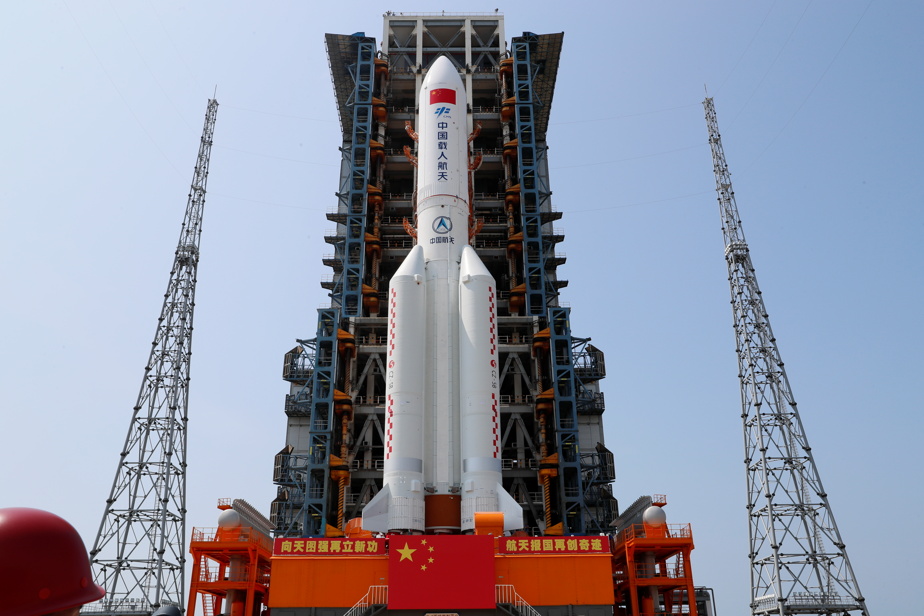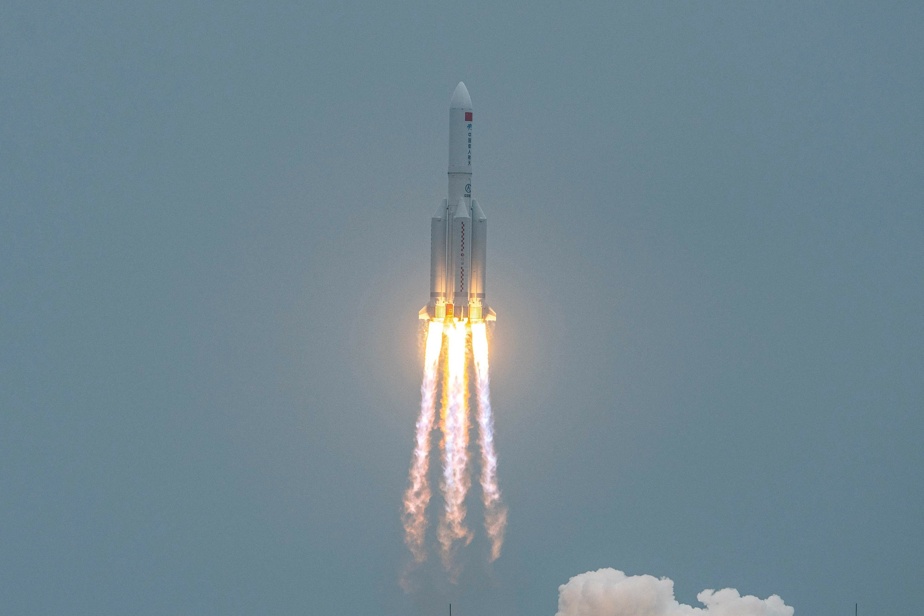(Beijing) The risk of damage is “low”, even “small”, but not zero: the Chinese missile must return uncontrolled this weekend in the Earth’s atmosphere, however, China and many experts, considering the hypothesis the minimum of Damage to the ground.
China put the first unit of its space station into orbit on April 29, thanks to the Long-March 5B carrier rocket – China’s most powerful launcher and imposed.
It is the first stage of this missile, currently in orbit, that should return to Earth. It is gradually losing its height and its fall point is not currently known.
Space-Track, which used US military data, tweeted a new estimate of when and where it entered the atmosphere: 2:11 a.m. GMT over the Mediterranean basin, with uncertainty an hour before or after that estimate.
Space Control Squadron at Vandenberg Air Force Base in California told SpaceTrack, “I won’t know the exact location until after” the missile has landed.
China is very cautious about this issue and has not released any forecasts about the possibility of the launch pad returning to Earth’s atmosphere every hour, as it should completely or partially disintegrate.
For the Russian space agency Roscosmos, entry is possible at 11:30 pm GMT on Saturday (7:30 pm ET) in southern Indonesia. The Pentagon expects 11 PM GMT – with each (7 PM EST) but with a nine-hour margin of error on either side of that estimate.
The window should recede gradually over a period of hours.
After an embarrassing long silence from Chinese space and diplomatic authorities, Beijing finally responded on Friday.
“Most of the components (of the missile) will be burned and destroyed when they enter the atmosphere again,” said Wang Wenbin, a spokesman for the Chinese Foreign Ministry.
“The possibility of damaging air activities or (people, buildings and activities) on the ground is very low,” he said.
Astronomer Jonathan McDowell responded on Twitter on Saturday: “New predictions from 18SPCS Space Force are pushing elements into orbit: Costa Rica, Haiti, Spain, Sardinia, Italy, Greece, Crete, Israel, Jordan, Saudi Arabia, Australia, New Zealand.”
The media is discreet

PHOTO CHINA DAILY, via Reuters
Chinese media provided minimal coverage of the event on Saturday, and contented themselves with repeating the statements made by a diplomatic spokesperson the day before.
If parts of the rocket remain intact after re-entering the atmosphere, there is a good chance of damage at sea because the planet is covered in 70% water.
“We hope that they land in a place where they will not harm anyone,” said Mike Howard, a spokesman for the US Department of Defense, on Friday, stressing that the United States was tracking the missile.
US Defense Secretary Lloyd Austin confirmed this week that his country has no intention of destroying the missile. However, he hinted that its launch had not been planned with sufficient care by China.
According to several experts interviewed by Agence France-Presse, the risk of debris falling from a heavy launch pad onto a populated area exists, but it is unlikely.
Florent Delphi, an astronomer at the Paris-PSL Observatory, predicts, “Given the size of the object, there are necessarily large pieces that will remain.”
But the potential for an impact on a populated area is “minuscule, less than one in a million, without a doubt,” says Nicolas Bubriensky, head of engineering and innovation at the European Space Agency (ESA).
Metal Pieces
“You don’t have to worry too much,” notes Jonathan McDowell, an astronomer at the Harvard-Smithsonian Center for Astrophysics, in the United States, and a major specialist in space debris.
“But the fact that a ton of metal hit the ground at hundreds of kilometers per hour is not a good practice, and China should review the Long March 5B Missions design to avoid this.”
In 2020, the debris of another Longue-Marche missile crashed into villages in Côte d’Ivoire, causing damage but no injuries.
In April 2018, the Chinese space laboratory Tiangong-1 disintegrated when it entered the atmosphere, two years after it was out of service.
China has been investing billions of euros in its space program for several decades.
It sent its first astronaut into space in 2003. At the beginning of 2019, it landed with a machine on the far side of the moon – for the first time in the world.
Last year, he brought samples from the moon and terminated the Beidou navigation satellite system (a competitor of the US GPS).
China plans to land a robot on Mars in the coming weeks. It also announced that it wants to build a lunar base with Russia.

“Extreme twitteraholic. Passionate travel nerd. Hardcore zombie trailblazer. Web fanatic. Evil bacon geek.”

